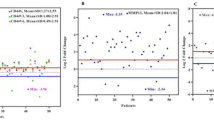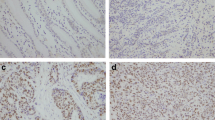Abstract
Tumor invasion and metastasis are the most common causes of death in gastric carcinoma. Twist, a transcription factor of the basic helix-loop-helix class, reportedly regulates cancer metastasis and induces epithelial-mesenchymal transition (EMT). We evaluated the expression of Twist and its effect on cell migration in gastric carcinoma (GC). Twist expression was detected by real-time quantitative RT-PCR in gastric tumor tissue, metastatic lymph nodes and normal gastric tissue from 47 gastric carcinoma patients who had undergone gastrectomies with radical lymph node dissections without preoperative treatment. Twist expression was also analyzed immunohistochemically in 436 gastric cancer cases. GC tumor tissue and metastatic lymph nodes was upregulated compared with normal gastric mucosa (P < 0.05). Twist protein expression differed significantly among gastric tumor tissue, matched normal gastric mucosa, and lymph nodes (P < 0.05) In stages I, II, and III, 5-year survival rates of patients with high Twist expression were significantly lower than in patients with low expression (P < 0.05). In stage IV, Twist expression did not correlate with 5-year survival rates (P = 0.07). Further multivariate analysis suggested that depth of invasion, lymph-node and distant metastases, TNM stage, and up-regulation of TWIST were independent prognostic indicators for GC. Twist expression in gastric cancer is associated significantly with lymph-node and distant metastases, and poor prognosis. Twist may be a useful marker for the development, progression and metastasis of GC.


Similar content being viewed by others
References
Zhan WH, Han FH (2008) Surgical therapy of gastric cancer in china. J Pract Oncol 23:91–93
Eccles SA, Welch DR (2007) Metastasis: recent discoveries and novel treatment strategies. Lancet 369:1742–1757
Gilles C, Thompson EW (1996) The epithelial-to-mesenchymal transition and metastatic progression in carcinoma. Breast J 2:83–96
Hay ED (1995) An overview of epithelio-mesenchymal transformation. Acta Anat 154:8–20
Monk M, Holding C (2001) Human embryonic genes re-expressed in cancer cells. Oncogene 20:8085–8091
Bates RC, Mercurio AM (2005) The epithelial-mesenchymal transition (EMT) and colorectal cancer progression. Cancer Biol Ther 4:365–370
Xue C, Plieth D, Venkov C et al (2003) The gatekeeper effect of epithelial-mesenchymal transition regulates the frequency of breast cancer metastasis. Cancer Res 63:3386–3394
Thiery JP, Sleeman JP (2006) Complex networks orchestrate epithelia-mesenchymal transitions. Nat Rev Mol Cell Biol 7:131–142
Thiery JP (2003) Epithelial-mesenchymal transitions in development and pathologies. Curr Opin Cell Biol 15:740–746
Thiery JP (2002) Epithelial-mesenchymal transitions in tumour progression. Nature Rev 2:442–454
Yook JI, Li XY, Ota I et al (2005) Wnt-dependent regulation of the E-cadherin repressor snail. J Biol Chem 280:11740–11748
Zhou BP, Deng J, Xia W et al (2004) Dual regulation of Snail by GSK-3beta-mediated phosphorylation in control of epithelial-mesenchymal transition. Nature Cell Biol 6:931–940
Cheng GZ, Zhang W, Wang LH (2008) Regulation of cancer cell survival, migration, and invasion by Twist: AKT2 comes to interplay. Cancer Res 68:957–960
Yang J, Mani SA, Donaher JL et al (2004) Twist, a master regulator of morphogenesis, plays an essential role in tumor metastasis. Cell 117:927–939
Yang J, Mani SA, Weinberg RA (2006) Exploring a new twist on tumor metastasis. Cancer Res 66:4549–4552
Lee TK, Poon RT, Yuen AP et al (2006) Twist overexpression correlates with hepatocellular carcinoma metastasis through induction of epithelial-mesenchymal transition. Clin Cancer Res 12:5369–5376
Yang Z, Zhang X, Gang H et al (2007) Up-regulation of gastric cancer cell invasion by Twist is accompanied by N-cadherin and fibronectin expression. Biochem Biophys Res Comm 358:925–930
Lee HS, Lee HK, Kim HS et al (2003) Tumour suppressor gene expression correlates with gastric cancer prognosis. J Pathol 200:39–46
Lee HS, Lee HK, Kim HS et al (2001) MUC1, MUC2, MUC5AC, and MUC6 expressions in gastric carcinomas: their roles as prognostic indicators. Cancer 92:1427–1434
Zhang D, Salto-Tellez M, Putti TC et al (2003) Reliability of tissue microarrays in detecting protein expression and gene amplification in breast cancer. Mod Pathol 16:79–84
Lee HS, Cho SB, Lee HE et al (2007) Protein expression profiling and molecular classification of gastric cancer by the tissue array method. Clin Cancer Res 13:4154–4163
Kolev Y, Uetake H, Iida S et al (2007) Prognostic significance of VEGF expression in correlation with COX-2, microvessel density and clinicopathological characteristics in human gastric carcinoma. Ann Surg Oncology 14:2738–2747
Mizokami K, Kakeji Y, Oda S et al (2006) Clinicopathologic significance of hypoxia-inducible factor 1 alpha overexpression in gastric carcinomas. J Surg Oncology 94:149–154
Song LB, Liao WT, Mai HQ et al (2006) The clinical significance of twist expression in nasopharyngeal carcinoma. Cancer Lett 242:258–265
Kolev Y, Uetake H, Iida S et al (2007) Prognostic significance of VEGF expression in correlation with COX-2, microvessel density, and clinicopathological characteristics in human gastric carcinoma. Ann Surg Oncol 14:2738–2747
Chou YY, Jeng YM, Lee TT et al (2007) Cytoplasmic CD24 expression is a novel prognostic factor in diffuse-type gastric adenocarcinoma. Ann Surg Oncol 14:2748–2758
Chen ZF, Behringer RR (1995) Twist is required in head mesenchyme for cranial neural tube morphogenesis. Genes Dev 9:686–699
Leptin M (1991) Twist and snail as positive and negative regulators during Drosophila mesoderm development. Genes Dev 5:1568–1576
Maestro R, Dei Tos AP, Hamamori Y et al (1999) Twist is a potential oncogene that inhibits apoptosis. Genes Dev 13:2207–2217
Valsesia-Wittmann S, Magdeleine M, Dupasquier S et al (2004) Oncogenic cooperation between H-Twist and N-Myc overrides failsafe programs in cancer cells. Cancer Cell 6:625–630
Yang J, Mani SA, Donaher JL et al (2004) Twist, a master regulator of morphogenesis, plays an essential role in tumor metastasis. Cell 117:927–939
Rosivatz E, Becker I, Specht K et al (2002) Differential expression of the epithelial-mesenchymal transition regulators snail, SIP1, and twist in gastric cancer. Am J Pathol 161:1881–1891
Martin TA, Goyal A, Watkins G et al (2005) Expression of the transcription factors snail, slug, and Twist and their clinical significance in human breast cancer. Ann Surg Oncol 12:488–496
Hoek K, Rimm DL, Williams KR et al (2004) Expression profiling reveals novel pathways in the transformation of melanocytes to melanomas. Cancer Res 64:5270–5282
Watanabe O, Imamura H, Shimizu T et al (2004) Expression of twist and wnt in human breast cancer. Anticancer Res 24:3851–3856
Zi X, Guo Y, Simoneau AR et al (2005) Expression of Frzb/secreted Frizzled-related protein 3, a secreted Wnt antagonist, in human androgen-independent prostate cancer PC-3 cells suppresses tumor growth and cellular invasiveness. Cancer Res 65:9762–9770
Guo Y, Zi X, Koontz Z et al (2007) Blocking Wnt/LRP5 signaling by a soluble receptor modulates the epithelial to mesenchymal transition and suppresses met and metalloproteinases in osteosarcoma Saos-2 cells. J Orthop Res 25:964–971
Bienz M, Clevers H (2000) Linking colorectal cancer to Wnt signaling. Cell 103:311–320
Acknowledgments
This study was support by grants from the Zhejiang Provincial Department of Science and Technology Research Foundation (2008C33040) and the Zhejiang Provincial Medical Science Research Foundation (2007A013).
Disclosure/conflict of interest
None of the authors has a conflict of interest to disclose.
Author information
Authors and Affiliations
Corresponding author
Rights and permissions
About this article
Cite this article
Ru, GQ., Wang, HJ., Xu, WJ. et al. Upregulation of Twist in Gastric Carcinoma Associated with Tumor Invasion and Poor Prognosis. Pathol. Oncol. Res. 17, 341–347 (2011). https://doi.org/10.1007/s12253-010-9332-0
Received:
Accepted:
Published:
Issue Date:
DOI: https://doi.org/10.1007/s12253-010-9332-0




